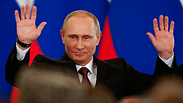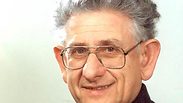

Now is the time to plead with our decision-makers to resist temptation and remain completely neutral at all costs. There are hundreds of thousands of Jews living both in Russia and in Ukraine, and each community sides with its own country. Only the independent Israel is in charge of what is called "the Jewish people," and there is no black and white here.
Putin's claims on the issue have yet to be countered. For example, he says that when Crimea was handed over to Ukraine, "the residents were not asked and were dragged about like a sack of potatoes. They went to sleep in one country, and woke up in another." He has also questioned why Ukraine was allowed to secede from the Soviet Union, but Crimea was not allowed to secede from Ukraine. After all, there is no disputing the fact that that is what the majority in Crimea had wanted.
Putin has also raised difficulties on the issue of Kosovo - indisputably a sovereign Serbian territory conquered by NATO armies, which later ma de a Western-sponsored declaration of sovereignty. "Why are the Russians banned from doing what the West is allowed to do?" Putin has asked.
Granted, there was a reason for the NATO invasion – the expulsion of thousands of Kosovo Muslims by the Serbs – but Putin is arguing that the coup in Kiev, the strings of which were largely pulled by the West, ousted a legally elected ruler in order to "get NATO to station its forces on the border."
Putin stated that, "Crimea is part of Russia's national ethos. It was and has remained in our hearts. Many places in it are full of Russian history, in addition to being a strategic territory. In the people's hearts and spirit, Crimea is an inseparable part of Russia."
We will still remind him of these words, although instead of 250 years of Russian history in Crimea, we have 3,000 years of Jewish history in Jerusalem, next to the Western Wall beside which Putin, on his second visit to Israel, warmly wished a Russian immigrant that he would get to see the construction of the Temple.
The comparison to Hitler's annexation moves is unfounded. Crimea was conquered by Catherine the Great, and was henceforth part of Russia until 1954, when Khrushchev "handed it over" for administration by Ukraine, as part of an internal arrangement within the Soviet Union. Austria, on the other hand, was never part of Germany, and the German speakers in Sudetenland never belonged to Germany.
Nor are Putin and his regime suspected of an ideology of expansion to "conquer the world." They are acting out of a position of weakness and in defense of a country that has already lost the Baltic states, not to mention the Czech Republic, Slovakia and Poland to NATO. In Georgia too, Russia only used force after Georgia fired first and invaded South Ossetia.
Today, unlike during the Cold War, Russia is not hostile towards Israel. On the contrary. Putin is vigorously combating anti-Semitism, he is not withholding any gestures of affinity and friendship toward his country's Jews, and is popular among many of his Jewish subjects. Putin's Passover greeting to the Jewish people included warm words that we never heard from either the tsars nor the Bolsheviks.
He was one of the first visitors to the new Jewish museum in Moscow, the biggest in the world, and donated to the museum – as a public symbol – one month's salary. He bought an apartment in Tel Aviv for his Jewish German teacher, an old woman whom he encountered years later in Israel.
Immediately after his reelection, Putin found a reason to visit Israel again, and until now he has kept his promise to our prime ministers and has not completed the delivery of S-300 anti-aircraft systems to Iran and Syria.
Of crouse, none of this is anywhere near our special relationship with the US, and our relationship with Russia is not perfect. And yet, we must not get dragged into this cold war.















